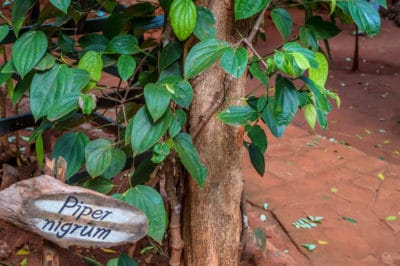Propagation and seedlings
You can grow Piper nigrum from seed, and some gardeners propagate this way. Only fresh seeds can be germinated just like many other tropical plants. They do not store well. It tends to have a slow growth rate, so most people purchase starts or propagate black pepper through cuttings.
If growing in a container, use a fluffy coir-based potting soil with vermiculite and compost mixed into it. This will prevent the pot from getting compacted or waterlogged, but still, allow it to store a lot of moisture.
Outdoors you are looking for a rich, well-draining soil. Peppercorn roots can tolerate some clay soils but are susceptible to rot if left in standing water.
Plant Care
There are always three aspects of the environment to look at when trying to provide a plant with its ideal setting.
- Temperature
- Moisture
- Sunlight
Temperature
Never let the temperature drop below 60°F (15°C). This will cause the plant to stop growing. It will grow again if put back in the heat, but it may take a while to recover. Peppercorn plants already have slow growth rate and may take up to three years to produce fruit.
Moisture
The humidity should be above 50%. If you live in a dry climate, consider growing peppercorn in a greenhouse where humidity can be controlled. In warm zones where plants are in the ground, make sure to stick to a regular watering schedule.
Sunlight
Most commercial producers of peppercorn use an overstory crop to filter the sunlight. Peppercorn plants prefer dappled light as opposed to direct sunlight. If your plant is growing indoors, there’s no need to worry about filtering the light. Outdoor plants can get burned by too much direct light. Possible overstory trees include coffee and cacao, mango, citrus, and figs.
Tips and Tricks
Feed peppercorn plants using a general all-purpose organic liquid fertilizer or compost tea every month through the summer season. Do not feed during the winter months.
While there is a general emphasis on keeping peppercorn well watered, over-watering leads to its own problems. Stick to a regular schedule for best results. Mulching around the base of plants helps lock in moisture and keep plants from drying out.
Use a greenhouse to gain humidity in regions where it may be low. Supplement light if growing indoors to encourage better fruit production.
